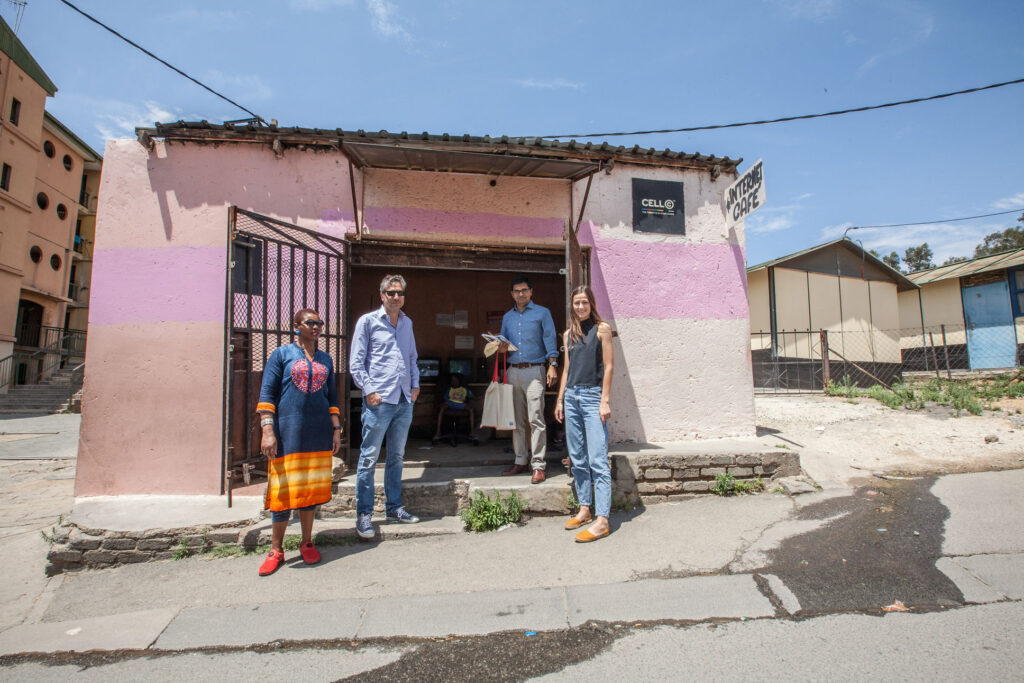

Microentrepreneurship—the practice of individuals operating small, often informal businesses with limited capital—plays a critical role in economies worldwide. It provides livelihoods, fosters innovation, and builds community resilience. At London Business School, learning happens far beyond the classroom. Two flagship experiential programs—the Johannesburg Global Business Experience (GBE) and Digital for Impact (DFI)—offer MBA students hands-on consulting opportunities in emerging markets. Both courses allow students to work directly with African entrepreneurs, but their design and delivery highlight different aspects of experiential learning. In a two-part blog series, one of our students explores the key features and differences of both programmes. The second part of the series can be found here.
Globally, small and medium-sized enterprises (SMEs) represent about 90% of businesses and more than 50% of employment. In emerging economies, formal SMEs contribute up to 40% of national income (GDP).[1]
Despite their importance, microentrepreneurs often face challenges such as limited access to finance, inadequate infrastructure, and regulatory hurdles. Yet they remain the bedrock of their communities—nurturing local economies, creating jobs, and providing essential goods and services. Their resilience and adaptability continue to drive innovation and economic growth across the globe.
Microentrepreneurship in Africa: Unique and Vital
On the African continent, microentrepreneurship is not simply common; it is essential. Micro, small, and medium-sized enterprises (MSMEs) are the backbone of Africa’s economy. They account for over 80% of employment and contribute approximately 50% to the continent’s GDP. Notably, microenterprises and self-employed entrepreneurs, many operating within the informal sector, drive 84% of total jobs across Africa.[2]
In South Africa, the MSME sector comprises around 3 million enterprises, employing approximately 13.4 million people. Of these, more than 2.5 million are micro-enterprises, with 72% operating informally.[3] In countries like Tanzania, nearly 80% of the working population identifies as entrepreneurs—compared to less than 10% in developed economies such as the U.S. or Israel. However, the nature of entrepreneurship in Africa differs starkly from the startup scenes in Silicon Valley or Tel Aviv. Here, entrepreneurship is often driven not by opportunity but by necessity.
In South Africa’s Alexandra township, where London Business School’s Johannesburg Global Business Experience (GBE) is held, this reality is on full display. Despite facing historical injustices, economic marginalization, and infrastructure gaps, Alexandra’s residents exhibit an extraordinary entrepreneurial spirit.[4] Microentrepreneurs in Africa often operate in highly informal economies, where formal business registration is low, banking services are limited, and social networks are crucial. Innovations like mobile money have revolutionized how small businesses transact in places lacking traditional financial infrastructure.
Moreover, entrepreneurship often carries social obligations. Business owners are expected to create employment for family and neighbours, and their success is deeply tied to community well-being. Africa boasts the world’s highest rates of entrepreneurship, with more than 1 in 5 working-age individuals initiating new businesses. Remarkably, over 75% of the youth plan to start a business within the next five years.[5] This surge is fuelled by a combination of necessity due to limited formal employment opportunities and the continent’s youthful demographic.
Why Microentrepreneurship Matters for MBA Education
Traditional MBA programs often focus heavily on corporate finance, multinationals, and tech startups. But to truly prepare for leadership in a globalized economy, understanding microentrepreneurship is indispensable.
Research by Anderson, Chandy, and Zia (Pathways to Profits) proves that targeted business skills training—especially marketing—can have transformational effects for small businesses in emerging economies. In randomized trials conducted in South African townships, firms receiving marketing training experienced a 64% increase in sales and a 57% increase in employment.
Studying and consulting for microentrepreneurs, as students do through London Business School’s Johannesburg GBE and Digital for Impact courses, cultivates:
- Customer-centric thinking: Entrepreneurs succeed or fail based on meeting hyper-local needs.
- Resilience and resourcefulness: In the absence of perfect conditions, creative problem-solving becomes essential.
- Cultural agility: Engaging with entrepreneurs from diverse backgrounds sharpens communication, empathy, and leadership skills.
- Systems thinking: Microenterprise success often depends on factors outside the business owner’s control, teaching students to think across sectors and systems.
Moreover, working with microentrepreneurs challenges students to rethink what “success” means. Instead of chasing unicorn valuations, they focus on stabilising incomes, supporting families, and fostering community well-being—a more human-cantered definition of entrepreneurship.
Microentrepreneurship is not a peripheral phenomenon—it is the foundation of economic life in much of the world. In Africa and other emerging markets, it sustains livelihoods, nurtures innovation, and builds community resilience against systemic challenges.
For MBA students seeking to become global leaders, engaging with microentrepreneurs offers more than business experience—it offers a new lens on resilience, adaptability, and inclusive prosperity. By understanding and supporting this dynamic sector, we prepare not just for success in boardrooms, but for leadership in a rapidly changing, interconnected world.
Citations
[1] https://www.worldbank.org/en/topic/smefinance?
[2] https://www.forbesafrica.com/current-affairs/2023/06/27/the-crucial-role-of-msmes-in-the-economic-growth-and-development-of-africa/
[3] https://www.finmark.org.za/knowledge-hub/articles/finscope-msme-south-africa-2024-key-findings-highlight-urgent-need-for-informal-sector-support?entity=blog&
[4] https://reciprocity.africa/lbs-gealex23-meet-up
[5] https://www.linkedin.com/pulse/harsh-realities-entrepreneurship-african-youth-why-many-casper-n-k–5xcmf/
About the author

Keertana Anandraj (MBA 2026) is an intern at the Wheeler Institute for Business and Development. Prior to joining London Business School she was a member of the International Sustainability Standards Board’s Technical Staff where she helped develop the first-ever global sustainability standards on climate-related risks and opportunities. A graduate of Wellesley College, Keertana is passionate about the role businesses can play in tackling the climate crisis.
